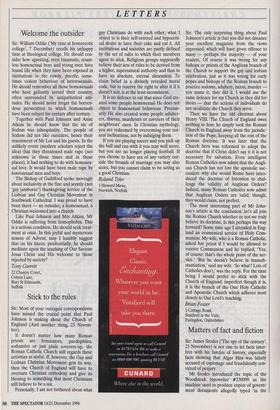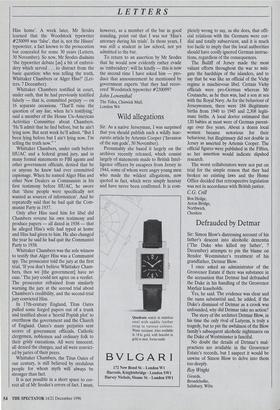Matters of fact and fiction
Sir: James Srodes (`The spy of the century', 23 November) is not one to let facts inter- fere with his fancies of history, especially facts showing that Alger Hiss was falsely accused of espionage and fraudulently con- victed of perjury.
Mr Srodes introduced the topic of the Woodstock typewriter #230099 as the machine used to produce copies of govern- ment documents allegedly typed 'in the Hiss home'. A week later, Mr Srodes learned that the Woodstock typewriter #230099 was 'false', that is, not the Hisses' typewriter, a fact known to the prosecution but concealed for some 30 years (Letters, 30 November). So now, Mr Srodes disdains 'the typewriter debate [as] a bit of embroi- dery which served . . . to distract from the basic question: who was telling the truth, Whittaker Chambers or Alger Hiss?' (Let- ters, 7 December).
Whittaker Chambers testified in court, under oath, that he had previously testified falsely — that is, committed perjury — on 16 separate occasions. 'That'll raise the question of any liar, when he's testifying,' said a member of the House Un-American Activities Committee about Chambers. 'He'll admit that he lied before, but he ain't lying now. But next week he'll admit, "But I been lying before but I ain't lying now. I'm telling the truth now."' Whittaker Chambers, under oath before HUAC and a federal grand jury, and in many formal statements to FBI agents and other government officials, denied that he or anyone he knew had ever committed espionage. When he named Alger Hiss and other New Dealers as Communists in his first testimony before HUAC, he swore that 'these people were specifically not wanted as sources of information'. And he repeatedly said that he had quit the Com- munist Party in 1937.
Only after Hiss sued him for libel did Chambers reverse his own testimony and produce papers — all dated in 1938 — that he alleged Hiss's wife had typed at home and Hiss had given to him. He also changed the year he said he had quit the Communist Party to 1938.
Whittaker Chambers was the sole witness to testify that Alger Hiss was a Communist spy. The prosecutor told the jury at the first trial, 'If you don't believe Whittaker Cham- bers, then we [the government] have no case.' The jury could not agree on a verdict. The prosecutor refrained from similarly warning the jury at the second trial about Chambers's credibility, and the second-trial jury convicted Hiss.
In 17th-century England, Titus Oates pulled some forged papers out of a trunk and testified about a 'horrid Popish plot' to overthrow the government and the Church of England. Oates's many perjuries sent scores of government officials, Catholic clergymen, noblemen and ordinary folk to their grisly executions. All were innocent, all denied the charges, and all were convict- ed by juries of their peers.
Whittaker Chambers, the Titus Oates of our century, is still believed by credulous people for whom myth will always be stronger than fact.
It is not possible in a short space to cor- rect all of Mr Srodes's errors of fact. I must, however, as a member of the bar in good standing, point out that I was not 'Hiss's attorney during his trials'. In those years, I was still a student in law school, not yet admitted to the bar.
To return to an assertion by Mr Srodes that he would now evidently rather evade as 'embroidery': will he kindly — this is now the second time I have asked him — pro- duce that announcement he mentioned by government experts 'that they had recov- ered' Woodstock typewriter #230099? John Lowenthal
The Tides, Chiswick Mall, London W4



















































































































 Previous page
Previous page